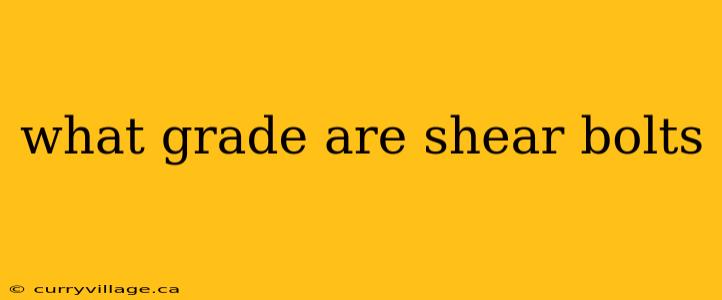Shear bolts, also known as shear pins or shear screws, are designed to fail predictably under a specific load. This makes them crucial for protecting equipment from damage caused by excessive forces or torque. But understanding the grade of a shear bolt is essential for choosing the right one for your application. This article will clarify what "grade" means for shear bolts and how to select the appropriate grade for your needs.
Understanding Shear Bolt Grades and Strength
The "grade" of a shear bolt refers to its tensile strength. Tensile strength is the maximum stress a material can withstand before it breaks when pulled apart. However, because shear bolts are designed to shear (break across their diameter), the grade indicates their resistance to shearing forces. A higher grade generally implies a higher shear strength. This strength is usually expressed in terms of pounds per square inch (psi) or megapascals (MPa).
Different standards define shear bolt grades. Common standards include:
- SAE (Society of Automotive Engineers): SAE grades define tensile strength and are often used in automotive and related applications. Common SAE grades for shear bolts include Grade 2, Grade 5, and Grade 8. Higher numbers indicate higher strength.
- ISO (International Organization for Standardization): ISO standards also define tensile strength, offering a global standard for bolt grades. ISO grades often correspond to or are equivalent to SAE grades.
Common Shear Bolt Grades and Their Strengths
While specific values can vary by manufacturer, here's a general idea of the relative strengths associated with common shear bolt grades:
- Grade 2: Relatively low strength, suitable for lighter-duty applications.
- Grade 5: Medium strength, common in many general applications.
- Grade 8: High strength, used for heavier-duty applications requiring higher shear resistance.
It's crucial to consult the manufacturer's specifications for precise shear strength values for each grade. These specifications will usually be found on the bolt itself (often marked with the grade number) or in the manufacturer's documentation.
How to Choose the Right Shear Bolt Grade
Selecting the correct shear bolt grade is vital to ensure proper safety and equipment protection. Here's a breakdown of factors to consider:
- Application: What is the bolt used for? A shear bolt in a lawnmower will require a much lower grade than one used in heavy machinery.
- Expected Load: Determine the maximum expected shear force the bolt will experience. This is crucial for choosing a bolt with sufficient strength.
- Material: The material of the bolt also influences its shear strength. Different materials (e.g., steel alloys) offer varying levels of strength.
Never underestimate the shear load. Choosing a bolt with a lower grade than necessary can result in premature failure, potentially causing damage or injury. It's often recommended to err on the side of caution and select a slightly higher grade than initially calculated.
Identifying Shear Bolt Grades
Shear bolts are often marked with their grade using stamped numbers or markings. Familiarize yourself with the marking conventions for the standards used in your application (SAE, ISO, or other). If you're unsure, consulting the manufacturer's documentation or a qualified engineer is crucial.
Conclusion
Choosing the correct grade of shear bolt is paramount for ensuring the safety and reliability of your equipment. Understanding the relationship between grade and shear strength, and carefully considering the factors outlined above, will help you select the appropriate bolt for your application. Remember to always consult manufacturer specifications for precise strength values and markings. Using the wrong grade can lead to equipment failure and potential safety hazards.
